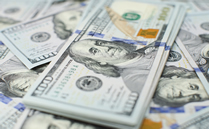 Anticipation of President Trump’s promised tax-related policies have propelled US stocks to record highs and are expected to prompt the Federal Reserve to begin a succession of rate hikes as early as this week, a boon to corporate treasuries investing cash. Should those and other factors continue strengthening the already mighty USD, however, the Federal Reserve may dampen the party.
Anticipation of President Trump’s promised tax-related policies have propelled US stocks to record highs and are expected to prompt the Federal Reserve to begin a succession of rate hikes as early as this week, a boon to corporate treasuries investing cash. Should those and other factors continue strengthening the already mighty USD, however, the Federal Reserve may dampen the party.
Stephen Gallagher, chief US economist and head of research Americas at Société Générale (SocGen), noted at a recent FXMPG meeting at the French bank’s New York office, that a moderate regime of rate hikes this year—three or four—is largely already priced into the financial markets. A sharp increase in the strength of the dollar could prompt the Fed to slow down the increases, similar to what happened last year, when four hikes were anticipated but only one arrived.
Mr. Gallagher provided 11 bullish USD factors, including Fed’s rate hikes, US infrastructure spending, Fed balance sheet reduction, and US protectionist policies. Elections in France and elsewhere Europe that may open the door to additional European Union exits as well as China’s economy and currency weakening, which SocGen anticipates in the second half of this year, could also strengthen the USD.
The only bearish factor on Mr. Gallagher’s list was likely tapering of financial asset purchases by the European Central Bank (ECB). However, should the dollar weaken unexpectedly, the Fed rate-hike program could become aggressive. “If we get more than one rate hike per quarter, that would be a shock to the market,” Mr. Gallagher said.
Mr. Gallagher presented a chart that traced the fed funds rate and provided three different projections of its direction over the next several years. In December, the Federal Open Market Committee’s (FOMC) forecasted fed funds rising steadily to nearly 3% by 2020, while the rate implied by the market wanes, reaching 2% by 2020. An FXPMG participant asked why the line representing SocGen’s forecast leveled off in 2019 and dipped in 2020.
“We forecast a recession, a short one,” Mr. Gallagher said, “The housing market still seems fairly strong, when it could otherwise drive a deeper recession, because there appears to be pent up demand.” He added that there were early signs of the economy ebbing last year, but the promise of the Trump administration’s tax cuts delayed a deeper slowdown.
SocGen forecasts 10-year Treasurys continuing to climb, reaching 2.9% by year-end. One factor is a more aggressive Fed, but the biggest factor is the ECB paring back its asset purchases; it said in December it would reduce its purchase of financial assets to 60 billion euros monthly from 80 billion euros starting in April.
“We think the ECB will pare back asset purchases … and totally get out of quantitative easing by early next year,” said Subadra Rajappa, head of US rates strategy at SocGen, adding that will support higher treasury yields.
SocGen is France’s second largest bank, so unsurprisingly one member asked about the country’ presidential elections in April. Mr. Gallagher noted several European elections this year in countries including Germany and The Netherlands that while potentially problematic pale compared to France’s, given the size of its economy in the context of the European Union (EU).
“Now, the election is alarmingly close to the Clinton/Trump probabilities that were widely disseminated before Trump’s victory,” Mr. Gallagher said. “There was always the idea he could win, but I know of very few who predicted it.”
Far-right candidate Marine Le Pen has been expected to win the first round on April 23, although Emmanuel Macron has inched ahead in recent polls, and a more centrist candidate such as Macron is anticipated to win the presidency in the second round of voting in May.
“In the second round, Le Pen has a 35% chance, which is too high in my mind,” Mr. Gallagher said, adding that even if Le Pen did win the anti-immigration and support for leaving the EU would be hard achieve. “There wouldn’t be any immediate changes, but there would be longer-term repercussions [for the EU],” he said.